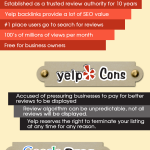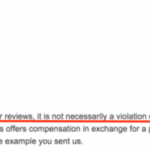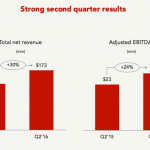California’s Highest Court To Review Yelp Censorship Order
by Wendy Davis, Staff Writer @wendyndavis, September 22, 2016
The California Supreme Court has agreed to hear Yelp’s appeal of an order requiring it to remove a negative review.

The court’s move, announced Wednesday, comes after dozens of Silicon Valley companies and outside organizations — including Google, Facebook, Twitter, Pinterest, Airbnb, and the Reporters Committee for Freedom of the Press — weighed in on Yelp’s side.
The takedown order stems from a lawsuit by attorney Dawn Hassell against a former client, who allegedly gave Hassell a bad review on Yelp. Hassell sued the former client, who never appeared in court to defend herself.
A trial judge awarded Hassell a default judgment of more than $500,000, and ordered the former client to remove her critique. The judge also took the unusual step of ordering Yelp to take down the post — although Yelp had never been notified about the lawsuit, much less given the opportunity to argue against the injunction.
Yelp intervened in the case and sought to vacate the order, arguing that it has the right to appear in court before being ordered to remove comments. A trial judge and appellate court rejected Yelp’s argument, prompting the company to ask the California Supreme Court to review the case.
Yelp raised numerous points, including that other unhappy business owners will be able to follow Hassell’s lead by suing commenters, obtaining default judgments, and then serving Web sites with injunctions.
The Reporters Committee for Freedom of the Press, The New York Times, Gannett and other media organizations sided with Yelp, arguing that judges shouldn’t order publishers to remove material without giving them a day in court.
Google added in its own letter to the California Supreme Court that the lower court’s ruling “undermines established expectations about when online intermediaries — including publishers of user-submitted content, search engines, and other services that help people access information on the Internet — may be required, on pain of contempt liability, to censor third-party speech.”
A group of law professors with expertise in digital media — including UCLA’s Eugene Volokh, Santa Clara University’s Eric Goldman and University of North Carolina’s David Ardia — added that the lower court violated Yelp’s free speech rights.
“The Court of Appeal erred in treating Yelp as essentially lacking First Amendment rights here,” the law professors wrote to the state’s highest court. “A newspaper cannot be ordered to take down an allegedly libelous comment, without having notice and an opportunity to be heard,” the academics said. “A bookstore cannot be ordered to remove an allegedly obscene book, and an art gallery cannot be ordered to re-move an allegedly obscene painting, without an opportunity to challenge the finding of obscenity.”
MediaPost.com: Search Marketing Daily
(64)












